Conan Re-Read: Conclusion
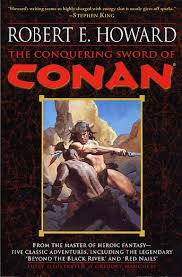 Bill Ward and I have just finished a re-read of every complete story of Conan the Cimmerian written by Robert E. Howard.
Bill Ward and I have just finished a re-read of every complete story of Conan the Cimmerian written by Robert E. Howard.
Howard: It’s hard to believe it’s been six months since we started this re-read. But then it’s hard to believe it’s over, and it’s hard to believe that there aren’t any more Conan stories. Such a fantastic character practically begs to have more adventures told about him, which is probably why the regrettable Conan pastiche industry popped up. Well, maybe not entirely regrettable, because I’ve read some I’ve really enjoyed. What’s regrettable is that for a long time they were packaged on equal footing with the real thing, or made available even when the real thing was out of print.
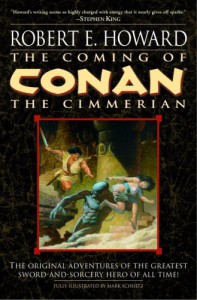 Bill: Ain’t that the truth. While I’m actually looking forward at this point to checking out the many pastiches I’ve never read — I’ve got a stack of Ace Conans that I’d started reading before we came up with the plans for this epic reread — I think the way REH’s stories were edited, diluted, manipulated, and concealed was contemptible. I can’t think of another author whose work was that famous who was treated so shabbily. I’m just happy we live in the age when, finally, most of his best work is available in easy-to-find volumes. The Wandering Star/Del Rey books, with their attention to restored texts and additional critical material and ephemera, are a beautiful and fitting tribute that was long overdue.
Bill: Ain’t that the truth. While I’m actually looking forward at this point to checking out the many pastiches I’ve never read — I’ve got a stack of Ace Conans that I’d started reading before we came up with the plans for this epic reread — I think the way REH’s stories were edited, diluted, manipulated, and concealed was contemptible. I can’t think of another author whose work was that famous who was treated so shabbily. I’m just happy we live in the age when, finally, most of his best work is available in easy-to-find volumes. The Wandering Star/Del Rey books, with their attention to restored texts and additional critical material and ephemera, are a beautiful and fitting tribute that was long overdue.
Howard: I’m in complete agreement there. Which pastiche are you planning to read? At this point I’ve worked my way through all of the well-recommended stuff, although it’s been so long since I read Wagner’s Road of Kings I might want to give that another try. Only recently, during this re-read, did I discover just how much fun the Roy Thomas Conan adaptions and pastiche can be. (For the curious, I discussed what I’d seen of the pastiche back here, and the article’s probably worth an update now that I’ve read a lot more of the comics.)
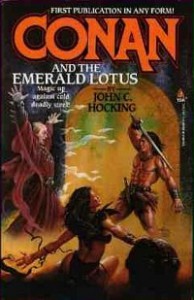 Bill: I’ve never read the deCamp and Carter pastiches, or the other stories by REH that deCamp Frankensteined into Conan tales. It’ll be a while before I jump into that series, though, as I’d be rereading all the REH tales again as well. As for other pastiches, I’ve only read a few — Wagner’s Road of Kings was good, and, of course, Hocking’s Emerald Lotus is terrific. I get the impression that a great many of the novel-length pastiches are pretty mediocre, however. Why not just reread REH in that case?
Bill: I’ve never read the deCamp and Carter pastiches, or the other stories by REH that deCamp Frankensteined into Conan tales. It’ll be a while before I jump into that series, though, as I’d be rereading all the REH tales again as well. As for other pastiches, I’ve only read a few — Wagner’s Road of Kings was good, and, of course, Hocking’s Emerald Lotus is terrific. I get the impression that a great many of the novel-length pastiches are pretty mediocre, however. Why not just reread REH in that case?
Howard: Right — and that’s where anyone should start. I love my long line of Del Rey Robert E. Howard books, beside hardbacks from the Robert E. Howard foundation, all upon a dedicated Robert E. Howard bookshelf. I used to have a whole smattering of different editions, many of which were second hand and pretty beaten up, but thanks to Del Rey and the foundation I’m been getting rid of a great many of my other collections.
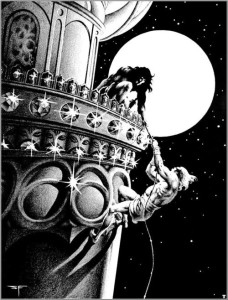 I came away from this re-read with an even greater appreciation for Howard’s work with Conan. I already number REH among my very favorite writers, and Conan among my favorite characters, so it’s no surprise that I liked what I found. But each time I revisit I’m confronted with the unassailable evidence of just how very good Howard truly was. And it seems as though, slowly but surely, there’s appreciation building about that. Unfortunately it also seems that the wider public isn’t much aware of the stories anymore. A lot of younger fantasy readers aren’t reading this good old stuff — to them I suppose stuff written in the ’90s is old stuff, and this is pliocene.
I came away from this re-read with an even greater appreciation for Howard’s work with Conan. I already number REH among my very favorite writers, and Conan among my favorite characters, so it’s no surprise that I liked what I found. But each time I revisit I’m confronted with the unassailable evidence of just how very good Howard truly was. And it seems as though, slowly but surely, there’s appreciation building about that. Unfortunately it also seems that the wider public isn’t much aware of the stories anymore. A lot of younger fantasy readers aren’t reading this good old stuff — to them I suppose stuff written in the ’90s is old stuff, and this is pliocene.
And that’s a shame, because so much about what makes fantasy fiction great is right here in the work of this astonishing pioneer. Anyone who’s going to be creating action scenes or huge battles or lost realms should make Howard’s fiction a first stop. And how about that pacing?
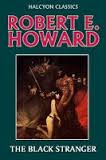 Bill: There’s a reason classics are classic. And we’ve looked at quite a few, Dunsany, Leiber, and now Howard. For a fantasy fan, let alone an author, to not have at least some familiarity with their work is both tragic and baffling. REH’s Conan, especially, I think, is the most accessible of them all — the pace, the intensity, the invention, and the character himself make for immediately rewarding fiction.
Bill: There’s a reason classics are classic. And we’ve looked at quite a few, Dunsany, Leiber, and now Howard. For a fantasy fan, let alone an author, to not have at least some familiarity with their work is both tragic and baffling. REH’s Conan, especially, I think, is the most accessible of them all — the pace, the intensity, the invention, and the character himself make for immediately rewarding fiction.
Howard: As far as the individual stories, I had only a few surprises. The most unpleasant was that “A Witch Shall be Born” was pretty weak. On the other hand, “The Hour of the Dragon” was even better than I remembered, and “The Black Stranger” was so much better than I recalled that it was a true joy to rediscover.
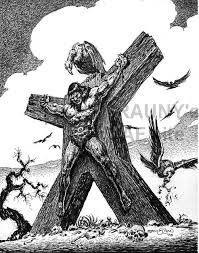 Bill: I certainly had a similar reaction to “A Witch Shall Be Born,” especially reading it right on the heels of so many strong stories. One of the best aspects of this reread for me was slowing down my approach to the stories by reading only one a week — we only ever worked ahead on multiple stories a few times, mostly they were all spaced out. This really let me pay attention to each piece as an individual. Most of my surprise moments were in realizing how much better and more vivid a particular story was that had previously been just a vague and undifferentiated memory for me. I suppose that’s the danger in reading a collection rather quickly; and I absolutely flew through these Del Rey’s when I first got them years ago. It was extremely rewarding to come back and give these pieces the focus they deserved.
Bill: I certainly had a similar reaction to “A Witch Shall Be Born,” especially reading it right on the heels of so many strong stories. One of the best aspects of this reread for me was slowing down my approach to the stories by reading only one a week — we only ever worked ahead on multiple stories a few times, mostly they were all spaced out. This really let me pay attention to each piece as an individual. Most of my surprise moments were in realizing how much better and more vivid a particular story was that had previously been just a vague and undifferentiated memory for me. I suppose that’s the danger in reading a collection rather quickly; and I absolutely flew through these Del Rey’s when I first got them years ago. It was extremely rewarding to come back and give these pieces the focus they deserved.
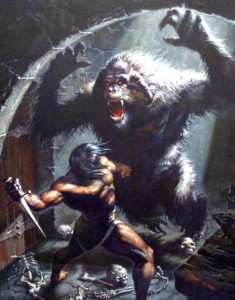 Howard: There’s a slight difference between a list of which Conan stories I think are best and which I’m most likely to re-read, and I don’t see any reason to give them both. “Beyond the Black River,” for reasons I’ve stated earlier, is among his best, but I’m in no hurry to revisit it.
Howard: There’s a slight difference between a list of which Conan stories I think are best and which I’m most likely to re-read, and I don’t see any reason to give them both. “Beyond the Black River,” for reasons I’ve stated earlier, is among his best, but I’m in no hurry to revisit it.
Bill: I agree with that distinction, for example I probably like “The God in the Bowl” more than I’d rate it on a pure quality scale. It’s perhaps too fine a point, and really not anything we need to belabor.
Howard: “The Tower of the Elephant” will probably always have first place on my most beloved list, owing to its brevity. It’s hard to fit in a quick re-read of the novel length The Hour of the Dragon or even “The People of the Black Circle” on a rainy Sunday afternoon.
Bill: Can you believe that “The Tower of the Elephant” is slightly longer than “The Phoenix on the Sword” and almost two thousand words longer than “The God in the Bowl?” There is a lot to be said for perfect pacing, it can warp time itself!
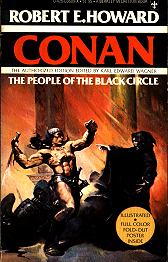 Howard: I hadn’t realized that! “The Tower of the Elephant” feels like the shortest of them all. Perhaps because it’s just so very finely crafted. I lose myself in it every time. In all fairness to some of the others, it probably edges them out, just a little, as my favorite. In the next tier are probably The Hour of the Dragon and “Black Colossus,” and very close on their heels the rest I enjoy including, “The Frost-Giant’s Daughter,” “The Phoenix on the Sword,” “The Scarlet Citadel,” “Queen of the Black Coast,” “Xuthal of the Dusk,” “Rogues in the House,” “The Devil in Iron,” “The People of the Black Circle,” “The Servants of Bit-Yakin,” and “The Black Stranger.” Add to that the opening half of “Red Nails” and one great scene from “A Witch Shall be Born.”
Howard: I hadn’t realized that! “The Tower of the Elephant” feels like the shortest of them all. Perhaps because it’s just so very finely crafted. I lose myself in it every time. In all fairness to some of the others, it probably edges them out, just a little, as my favorite. In the next tier are probably The Hour of the Dragon and “Black Colossus,” and very close on their heels the rest I enjoy including, “The Frost-Giant’s Daughter,” “The Phoenix on the Sword,” “The Scarlet Citadel,” “Queen of the Black Coast,” “Xuthal of the Dusk,” “Rogues in the House,” “The Devil in Iron,” “The People of the Black Circle,” “The Servants of Bit-Yakin,” and “The Black Stranger.” Add to that the opening half of “Red Nails” and one great scene from “A Witch Shall be Born.”
Bill: That’s the cream of the crop right there. Our lists are certainly similar. “Bit-Yakin” didn’t do as much for me, and I suspect I liked “Iron Shadows in the Moon” a lot more than you did. I also enjoyed “Beyond the Black River,” though I share some of your reservations there as well.
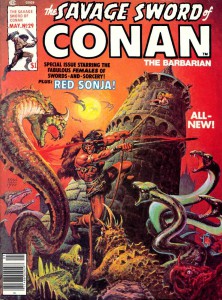 “The Tower of the Elephant” is practically the Platonic ideal of the sword & sorcery story. I think I’d call it my favorite Conan if there weren’t others that were just as strong, but achieve a different kind of effect. “The People of the Black Circle” is amazing, thirty-thousand words honed like a razor, exuberant yet completely under control. Both “The Scarlet Citadel” and “Black Colossus” are mini-epics in which REH manages to convey extraordinary battle scenes with comparatively few words (he also does this in some of his historicals — maybe a future reread topic!). “Queen of the Black Coast” has such a different feel to it, and it packs a real emotional punch and gets at the heart of the character of Conan, in many ways it’s lingered with me more than any other story. The Hour of the Dragon seems to gather up all the strands and put everything REH has learned and Conan has done into one story — it’s a masterpiece in the truest sense, the proof that REH ranks up there with the all time greats.
“The Tower of the Elephant” is practically the Platonic ideal of the sword & sorcery story. I think I’d call it my favorite Conan if there weren’t others that were just as strong, but achieve a different kind of effect. “The People of the Black Circle” is amazing, thirty-thousand words honed like a razor, exuberant yet completely under control. Both “The Scarlet Citadel” and “Black Colossus” are mini-epics in which REH manages to convey extraordinary battle scenes with comparatively few words (he also does this in some of his historicals — maybe a future reread topic!). “Queen of the Black Coast” has such a different feel to it, and it packs a real emotional punch and gets at the heart of the character of Conan, in many ways it’s lingered with me more than any other story. The Hour of the Dragon seems to gather up all the strands and put everything REH has learned and Conan has done into one story — it’s a masterpiece in the truest sense, the proof that REH ranks up there with the all time greats.
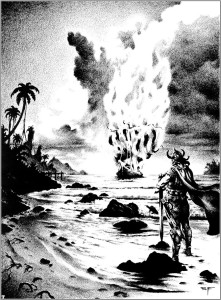 One of the chief pleasures of this reread was experiencing these stories in their proper order, so much so that it felt like discovering Conan and the world of Hyboria right alongside REH. The earliest stories in particular present a through-line of development for the series — a region seen on a map in “The Phoenix on the Sword” is the setting for “The Frost-Giant’s Daughter,” a line of description in “Queen of the Black Coast” becomes the title of “Black Colossus.” It’s like REH is moving so fast, has so much momentum, that he’s spinning off ideas left and right and leaving a trail behind him that anyone can follow. But we can also see when REH stumbles a bit, either in trying out a new mode of inspiration as he did in “The Vale of Lost Woman,” or in reducing Conan to a minor, if still the most interesting, character as in “A Witch Shall Be Born.” But no matter how much he experimented with the character and the “formula,” — or, even, how many times he used the same name for different characters in subsequent stories or repeated a plot point or the premise of a scene — it always seemed to me that there was a tremendous sense of connectedness between the tales. The cohesion, I think, is due to REH’s sincerity. He believed not only in what he was saying, but he believed in Conan.
One of the chief pleasures of this reread was experiencing these stories in their proper order, so much so that it felt like discovering Conan and the world of Hyboria right alongside REH. The earliest stories in particular present a through-line of development for the series — a region seen on a map in “The Phoenix on the Sword” is the setting for “The Frost-Giant’s Daughter,” a line of description in “Queen of the Black Coast” becomes the title of “Black Colossus.” It’s like REH is moving so fast, has so much momentum, that he’s spinning off ideas left and right and leaving a trail behind him that anyone can follow. But we can also see when REH stumbles a bit, either in trying out a new mode of inspiration as he did in “The Vale of Lost Woman,” or in reducing Conan to a minor, if still the most interesting, character as in “A Witch Shall Be Born.” But no matter how much he experimented with the character and the “formula,” — or, even, how many times he used the same name for different characters in subsequent stories or repeated a plot point or the premise of a scene — it always seemed to me that there was a tremendous sense of connectedness between the tales. The cohesion, I think, is due to REH’s sincerity. He believed not only in what he was saying, but he believed in Conan.
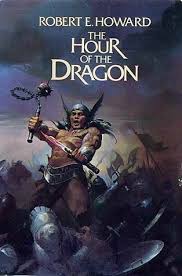 Howard: Very finely said, Bill. I don’t think there’s much I can add to that, although I think it’s that sincerity and belief that has made it possible for so many of the rest of us to believe in Conan as well.
Howard: Very finely said, Bill. I don’t think there’s much I can add to that, although I think it’s that sincerity and belief that has made it possible for so many of the rest of us to believe in Conan as well.
If you were going to suggest some stories for first time visitors to Conan, where would you point them?
Bill: Well, I think “The Tower of the Elephant” probably leaps to both our minds as a solid introduction, and there is probably no way you could go wrong with that. But it also occurred to me that, for many readers, short fiction is really sort of an alien indulgence — and with that in mind I’d probably recommend The Hour of the Dragon to a lot of readers, especially young ones, that just don’t quite get the short story thing, but love fantasy novels. As an introduction, it’s essentially all-inclusive — REH was even writing it with a completely new audience in mind, and he does a great job building the world and the character of Conan. I think it would convey just what sword & sorcery is all about, and the headlong pace is a good introduction to how the shorts stories work. There are many strong stories to choose from, though, and you could even tailor your selection based on the reader’s tastes; we’ve got everything from pirate stories and massed battles to double-dealing roguery and lost worlds. What do you think, are there a top three or so that you could recommend to just about anyone?
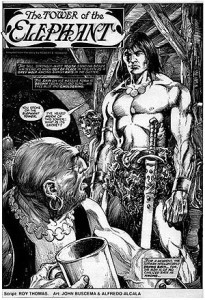 Howard: Growing up as I did reading and re-reading Swords Against Death (my first introduction to sword-and-sorcery) and then other short story compilations, I have a hard time accepting that some readers find short stories a foreign landscape. It’s as if they never want to watch an episodic tv show — they have to have a miniseries. (And those kids should get off my lawn!) That said, I think the choice of The Hour of the Dragon is an astute one for exactly the reasons you cite. If they were up for trying short stories I’d probably point them first at “The Tower of the Elephant,” and if it proved interesting, then either “Black Colossus” or “The People of the Black Circle” depending upon their own personal interests. I think once they were that far in they’d probably be good to go to explore on their own.
Howard: Growing up as I did reading and re-reading Swords Against Death (my first introduction to sword-and-sorcery) and then other short story compilations, I have a hard time accepting that some readers find short stories a foreign landscape. It’s as if they never want to watch an episodic tv show — they have to have a miniseries. (And those kids should get off my lawn!) That said, I think the choice of The Hour of the Dragon is an astute one for exactly the reasons you cite. If they were up for trying short stories I’d probably point them first at “The Tower of the Elephant,” and if it proved interesting, then either “Black Colossus” or “The People of the Black Circle” depending upon their own personal interests. I think once they were that far in they’d probably be good to go to explore on their own.
But then I’ve noticed in comments sections that some of our readers started their REH reading with “Red Nails” or even “Beyond the Black River,” a story that delayed my own entry into the REH fan club for a couple of extra years. In short, I just don’t know WHAT will work — I’d probably tailor those recommendations depending upon the reader. Even the weakest of the tales have strong points. There’s a little bit of magic in all of them.
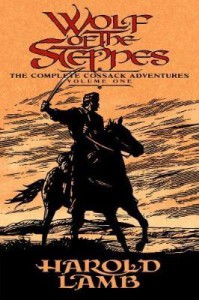 While not a grueling marathon by any stretch, Bill and I found ourselves a little taxed in the back half of this re-read, when many of the stories proved longer. We’re going to lay off any more re-reads until Spring. When we return, we’re talking about looking at some more Leigh Brackett, and then perhaps some Harold Lamb. I’m also tossing around the idea about visiting some other Robert E. Howard, but are there other old writers you’re interested in looking at, Bill? How about the rest of you?
While not a grueling marathon by any stretch, Bill and I found ourselves a little taxed in the back half of this re-read, when many of the stories proved longer. We’re going to lay off any more re-reads until Spring. When we return, we’re talking about looking at some more Leigh Brackett, and then perhaps some Harold Lamb. I’m also tossing around the idea about visiting some other Robert E. Howard, but are there other old writers you’re interested in looking at, Bill? How about the rest of you?
Bill: I think Clark Ashton Smith would be a good choice, and possibly a return to our old friend Lord Dunsany. We could perhaps instead look at an anthology series, such as Flashing Swords or Thieves’ World. Or we could do the unexpected and pick a classic collection from someone like Bradbury or Zelazny. I think I’d always be ready for more REH, though, and there’s plenty to choose from there.
Howard: Hmm. Clark Ashton Smith might be an interesting, and challenging choice. His fiction is so rich I usually can’t read more than a few in a row, but perhaps a shorter collection would be an interesting place to start. That said, I’ve been jonesing (see what I did there?) for another look at Lamb’s Cossack stories. The only difficulty there is that most of them stretch on to “People of the Black Circle” length. I wonder if we could alternate them with shorter works from others?
Bill: The odd juxtaposition of CAS one week and Khlit the next just might prove to be a chocolate-in-my-peanut-butter moment. Weird thing is, in the case of our Conan re-read, we were sort of getting a bit of both of those kinds of stories in every tale. REH was truly an amazing writer.
Howard: No argument there. He was a trail blazer. And in a lot of ways, the rest of us are still sprinting to keep up.
See you all in a couple of months, when our re-read series continues with a new book or two! In the mean time, I’m sure I’ll keep blathering about cool books I’m reading, old pulp, the occasional game, and the writing life.
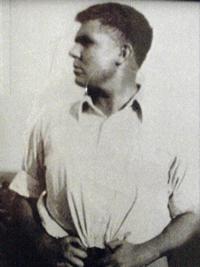
34 Comments